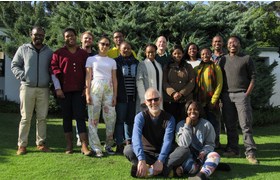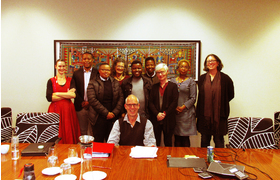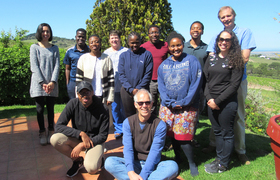Why the people's Parliament is failing the people
19 September 2017
As long as members of the South African Parliament are selected by – and answerable to – their parties rather than the voters, there will be limited public accountability. So argue two researchers in law in a chapter of a new book on the role of political parties in democratic South Africa. Their insights throw new light on the failure of the recent vote of no confidence in the president and efforts to hold him to account for Nkandla.
South Africa may have gained a ʻpeople’s Parliament’ in 1994, which represented a decisive break from the long years of oppression and illegitimacy, but the legislature often fails to live up to its critical task of holding the executive to account.
This is exacerbated by the dominance of a ruling party for whose members of Parliament (MPs) there is little incentive to adopt independent or critical postures on policy or the conduct of the president or ministers in the Cabinet. The costs of doing so can be high, and without electoral reform that guarantees direct accountability to voters, this is unlikely to change.
This is the key thrust of a collaboration between UCT Professor of Public Law Danwood Chirwa and law lecturer Phindile Ntliziywana in their chapter “Political parties and their capacity to provide parliamentary oversight” in a recent publication, Political Parties in South Africa: do they undermine or underpin democracy?
Chirwa and Ntliziywana acknowledge the development of oversight mechanisms and fundamental shifts in improving accountability since 1994 – from opening parliamentary committee proceedings to the public and the media, to adopting a greater constitutional framework that reinforces public accountability.
“Some good things have happened, especially in the way institutions can be called to account,” says Chirwa. “But it’s when it matters most – in calling the president and cabinet ministers to account – that the system fails.”
Relying on an ethical executive
It only functions, he says, as long as the executive performs well, is ethical and observes the constitutional boundaries that define the separation of powers and the role of other institutions of oversight (such as the public protector).
“But where there’s a failure of accountability and constitutionalism at the top, and if corruption sets in at that level, the system crumbles and fails.”
“Where there’s a failure of accountability and constitutionalism at the top, and if corruption sets in at that level, the system crumbles and fails.”
Toeing the party line
The authors isolate three major impediments. The first is that voters can’t hold individual representatives to account, but can only petition the party to whip them into line.
“If a party does not care about you, that’s the end of it,” says Ntliziywana. “And because the party decides who goes to Parliament, MPs are expected to account to the party. Even if MPs feel strongly about an issue, they are expected to toe the party line, and those who don’t – as we have seen following the most recent vote of no confidence – are singled out for harassment.”
The second deficiency is the dominance of the ANC, he says. “This kills oversight because there is no real threat to the dominant party’s hegemony; it becomes complacent and uses its majority to frustrate oversight. The latest motion of no confidence, for instance, was the eighth, and all of them have failed because the party just throws in the numbers, and that’s it.
“The consequence is that oversight is left to opposition parties.”
Why the EFF’s unorthodox methods may have worked
Ntliziywana observes that the controversy over multimillion-rand state spending on President Jacob Zuma’s Nkandla residence – dealt with in detail in the chapter – is an illustrative case.
“The EFF resorted to unorthodox methods to hold the ruling party to account on this, and – though we may have regretted their rowdy conduct in Parliament – it had the desired effect. If everyone had stuck to parliamentary rules and the conventions of decorum, the ANC would simply have dominated and we would not be where we are today with Nkandla.”
“The EFF resorted to unorthodox methods to hold the ruling party to account on this, and – though we may have regretted their rowdy conduct in Parliament – it had the desired effect.”
The third issue concerns the relationship between the legislature and the executive arising from the “tendency of all parties to take their most senior members to the executive and fill their parliamentary seats with more junior members”.
“MPs are at a political disadvantage in holding to account members of the executive who also occupy senior posts in the party,” he says. “This further hampers oversight.”
Accountability is a critical condition
Chirwa and Ntliziywana argue that accountability is the “critical” condition of “establishing a functional democracy that fulfils its promises to its people”.
Yet, they write, as long as parties, and not voters, call the shots, there are “no incentives for MPs to exercise independent judgment” and – particularly where members of the executive have been accused of wrongdoing – they have tended to recoil into their party shells, thereby failing to act collectively to hold the executive to account.
 This work is licensed under a Creative Commons Attribution-NoDerivatives 4.0 International License.
This work is licensed under a Creative Commons Attribution-NoDerivatives 4.0 International License.
Please view the republishing articles page for more information.
New Generation of Academics Programme (nGAP)
UCT has responded energetically to the New Generation of Academics Programme (nGAP), an opportunity provided by the Department of Higher Education (DHET) to build a new generation of black South African academics. The DHET’s 2015 vision document, “Staffing South Africa’s Universities Framework: A comprehensive, transformative approach to developing future generations of academics and building staff capacity”, proposes a suite of initiatives to address the challenge, with nGAP being the major instrument to increase the numbers of black South African academics.
The programme “involves the recruitment of highly capable scholars as new academics, against carefully designed and balanced equity considerations and in light of the disciplinary areas of greatest need”. The nGAP scholars are appointed into permanent positions where from the outset their conditions are customised to ensure their successful induction into the ranks of established academics.
The DHET provides funding over a six-year period to support the appointment of an nGAP lecturer, and their time is protected to provide the best possible opportunity for the completion of a doctorate degree in the shortest possible time. Once the degree is completed, the nGAP lecturer’s teaching commitments are steadily increased until they shoulder a full teaching load.
Since the first advertisement for nGAP posts in 2015, UCT has been awarded 17 nGAP positions: 5 (Phase 1), 4 (Phase 2), 3 (Phase 3) and 5 (Phase 4). These are distributed across all faculties.
UCT’s nGAP scholars operate as a single cohort, managed and coordinated by Dr Robert Morrell. Lecturers meet for quarterly meetings, writing retreats and various capacity-building activities all designed to support the completion of postgraduate qualifications (particularly doctorates) and to develop records of achievement that will testify to their emergence as self-standing, excellent academics. Each lecturer is mentored by a senior scholar, who provides support and guidance on the challenges that routinely face academics.
The nGAP manager sets great store in building the cohesion of the cohort and encouraging the establishment of new UCT networks while producing a collaborative, mutually supportive and embracing work culture.
According to Dr Morrell, “This group of academics will lead UCT in 15 to 20 years’ time ... Their vision of excellence, of being African and South African, of serving a wider community and producing knowledge for the planet, the continent and the country, will power UCT in years to come.”
Newsletters
In the news









































